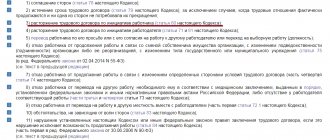The concept of opening an inheritance
The concept of inheritance is defined as the sum of all rights to the property of a deceased citizen and his obligations, passing to the heirs. The Civil Code of the Russian Federation (hereinafter referred to as the Civil Code of the Russian Federation) devoted a chapter to the procedure for transferring rights and obligations from the deceased to the heirs. In it, the legislator enshrines the concept of inheritance, the grounds for the emergence of the right to inherited property, legal facts entailing significant consequences, property that is recognized and considered as an inheritance mass and which testators can receive by inheritance, the procedure for obtaining and registering property rights in the order inheritance, as well as documents that must be provided in cases of various disputes related to inheritance, including when establishing the place of opening of the inheritance.
The opening of an inheritance is a legal fact, a procedure according to which persons can declare rights to a citizen’s property. The transfer of rights from the testator to the heirs is preceded by the death of the citizen. The death of a citizen is confirmed by a death certificate. The basis for issuing a certificate is a medical certificate of death, which states a significant fact - the date of death.
A death certificate is a document with which the inheritance case begins with a notary and from the moment of its issuance the entire procedure for registering an inheritance is linked.
A citizen who does not show up at his place of residence for a long period of time may be declared dead by the court. In this case, the date of death of the citizen is considered to be the date the decision enters into force.
From the moment of death of a citizen, the Civil Code of the Russian Federation determines the time of opening of the inheritance. The moment of opening the inheritance and the time of opening the inheritance are identical concepts. It is on the day of opening of the inheritance that the legal successors have the right to inheritance and it is from this day that the inheritance procedure begins. If the heir dies after the opening of the inheritance, the right to inherit his share passes to his heirs.
Article 1115 of the Civil Code of the Russian Federation. Place of opening of inheritance (current version)
As follows from the commented article, as a general rule, the place of opening of the inheritance is the last place of residence of the testator. In this case, reference is made to Art. 20 of the Civil Code, according to which the place of residence is recognized as the place where a citizen permanently or primarily resides. A citizen who informs creditors, as well as other persons, about his other place of residence bears the risk of the consequences caused by this.
The place of residence of minors under fourteen years of age or citizens under guardianship is recognized as the place of residence of their legal representatives - parents, adoptive parents or guardians.
For certain categories of citizens, the place of opening of inheritance is determined in a special manner.
Yes, Art. 2 of the Law of the Russian Federation of June 25, 1993 N 5242-1 “On the right of citizens of the Russian Federation to freedom of movement, choice of place of stay and residence within the Russian Federation”, in addition to the general rule, contains a special rule regulating the issue of determining the place of residence of a citizen belonging to an indigenous minority to the people of the Russian Federation who lead a nomadic and (or) semi-nomadic lifestyle and do not have a place where they permanently or primarily live. In particular, the place of residence (and, accordingly, the place of opening of inheritance after death) of such a person can be recognized as one of the settlements located in the municipal area within the boundaries of which the nomadic routes of this citizen pass (see also clause 26(1) of the Registration Rules and deregistration of citizens of the Russian Federation at the place of stay and at the place of residence within the Russian Federation and the List of officials responsible for registration, approved by Decree of the Government of the Russian Federation of July 17, 1995 N 713).
In the event of the death of a serviceman (soldier, sailor, sergeant or sergeant major) who was undergoing military service upon conscription, the place of opening of the inheritance is the place of permanent residence before conscription (see paragraph 23 of the specified Rules for registration of citizens of the Russian Federation). It is necessary to take into account that, in accordance with paragraphs. “b” clause 31 of these Rules, conscription for military service is the basis for deregistration of a citizen at his place of residence.
After the death of a person living on the territory of a monastery, temple or other religious building, the place of opening of the inheritance is considered to be the location of the corresponding building if the testator was registered there at the place of residence (see clause 25 of the Rules for registration of citizens of the Russian Federation at the place of residence).
The place of opening of inheritance after the death of persons in prison is the last permanent place of residence before the taking of these persons into custody. However, it should be taken into account that citizens sentenced to imprisonment are removed from registration at the place of residence on the basis of a court verdict that has entered into legal force (see paragraph “c”, paragraph 31 of the Rules for registration of citizens of the Russian Federation at the place of residence).
The place of opening of inheritance after the death of persons studying in higher educational institutions, educational institutions of the vocational education system, etc., who were located outside their permanent place of residence, is the place of their residence before entering the corresponding educational institution.
The most valuable part and value of inherited property are evaluative concepts, and in the event of a dispute, the issue can be resolved in court through an examination.
In this case, the place where the inheritance is opened is not a specific area, but the boundaries of a given city or locality. When determining the place of residence, registration at the place of residence is taken into account. Associated with the place of residence is the assumption that a citizen is always present in a certain place, even if this was not actually the case at the moment.
The place of death of the testator and the place of opening of the inheritance may not coincide in the event of the death of the testator outside his place of permanent residence (business trip, military service, etc.), as well as in the absence of a permanent place of residence.
Accurate determination of place of residence is of great importance in ensuring the stability of inheritance legal relations, because It is at the place of opening of the inheritance that the issue of applying the law of a particular country to specific inheritance relations is decided. In relation to real estate, the rule is that the place of discovery of the property will be the place where the property is registered. If the main part of the inheritance is expressed in shares or in a share in the capital of another company or partnership, then the inheritance is opened at the place of registration of the relevant legal entity. If there are equal parts of the property in two or more places, the place of opening of the inheritance is the location of the part of the property that has greater economic significance. The same rule is followed by notarial and judicial practice.
In addition, determining the place of opening of the inheritance is necessary in order to decide which notary office (notary) issues a certificate of the right to inheritance and takes measures to protect the inherited property in the interests of heirs, legatees, creditors or the state (Article 64 of the Fundamentals of the Legislation of the Russian Federation on notary). If it is incorrectly defined, a situation may arise when several inheritance cases will be opened for the property of one testator with different notaries, which can lead to a violation of the rights and legitimate interests of individual heirs.
In cases where the place of residence of the testator is unknown, including cases of registration of the testator only at the place of residence, the place of opening of the inheritance is recognized as the location of the inherited property, determined according to the rules of part two of the commented article.
According to clause 18 of the Methodological Recommendations for registration of inheritance rights (approved by the decision of the Board of the Federal Notary Chamber dated February 27 - 28, 2007, Protocol No. 02/07) in the event that the last place of residence of the testator who owned property on the territory of the Russian Federation is unknown or known, but located outside its borders, the place of opening of the inheritance in the Russian Federation in accordance with the rules of part two of Art. 1115 of the Civil Code of the Russian Federation recognizes the location on the territory of the Russian Federation: of real estate that is part of the hereditary property located in different places, or its most valuable part, and in the absence of real estate - movable property or its most valuable part. The value of property when establishing the place of opening of the inheritance is determined based on its market value at the time of opening of the inheritance, which can be confirmed by any evidence provided for in Art. 55 Code of Civil Procedure of the Russian Federation.
As noted in paragraph 17 of the Resolution of the Plenum of the Supreme Court of the Russian Federation dated May 29, 2012 No. 9 “On judicial practice in inheritance cases”, in exceptional cases the fact of the place of opening of the inheritance can be established by the court (paragraph 9, part 2, article 264 Code of Civil Procedure of the Russian Federation). When considering such an application, the court takes into account the length of residence of the testator in a specific place at the time of opening of the inheritance, the location of the inherited property in this place and other circumstances indicating the primary residence of the testator in this place.
Comment source:
“ARTICLE-BY-ARTICLE COMMENTARY TO PART THREE OF THE CIVIL CODE OF THE RUSSIAN FEDERATION”
S.P. Grishaev, 2018
How to open and accept an inheritance
The opening and acceptance of the inheritance occurs in the following order: The heirs, having learned about the opening of the inheritance, i.e. about the death of a citizen, in order to formalize rights in accordance with the law of the Russian Federation, they turn to a notary by writing a statement that expresses consent to accept the inheritance. The application form is developed by the notary independently, and its form is given to the heir to fill out. The application is recognized as a fact of legal significance, confirming the will of the heir to consent to receive the inheritance. The absence of such an expression of will entails consequences in the form of a notary’s refusal to take action to issue a certificate.
An heir who permanently resides with the owner of the property until the day of his death is considered to have actually accepted the inheritance. To register the rights, he needs to obtain a certificate of the right to inheritance from a notary within 6 months from the date of opening of the inheritance. As a basis for proving the fact of acceptance of the inheritance, a certificate of residence or registration at the place of establishment of the inheritance case may be submitted.
Documents to confirm the fact are individual in each case and the notary makes a decision in each case separately. In addition, heirs who have paid the debts of the testator, received funds for him, preserved or protected the inherited property, or entered into management or ownership of the inherited property may be recognized as having actually entered into the inheritance. If the notary refuses to recognize the applicant as an heir, the fact of acceptance of the inheritance may be challenged in court.
Actual acceptance
The law provides for such a concept as actual acceptance of inheritance. In cases of ignorance that after the death of the owner it was necessary to contact a notary, people continued to use the property left by the deceased citizen, for example, live in the residential area, etc. In this case, we can assume that it was actually accepted, but this does not change the fact that you will still need to contact a notary. And before completing the necessary papers, the future rightful owner will have to prove that he actually used the property left by the deceased during the period established for accepting the inheritance.
Opening an inheritance case, whether to receive property by law or by will, consists of the same actions. The most important of which is to contact a notary at the time prescribed by law. The authorized employee will explain the further procedure and the list of required papers depending on the situation.
Is there a deadline for accepting an inheritance?
According to the law, a period is a certain period of time during which certain actions must be performed. In the inheritance procedure, the term disciplines the participants in the relationship, provides guarantees of the inviolability of property rights, and its importance is important. Article 1154 of the Civil Code of the Russian Federation indicates that an inheritance is accepted within 6 months from the date of opening of the inheritance, which is counted from the date of death of the person. The notary accepts the application expressing the will of the heir during this period. Acceptance of the inheritance in fact occurs within the same period, and from the day the inheritance is opened, the heir must perform actions that indicate the acceptance of property from the deceased.
It is believed that such a period is sufficient for the heirs of the deceased citizen to decide whether to receive the inheritance or refuse it. An application submitted after the deadline has expired is not recognized and does not confirm the fact of acceptance of the inheritance. To protect rights in such a situation, the heir must file a claim in court. If during the proceedings it is recognized that the deadline was missed for a good reason and there are documents confirming this circumstance, the state body will restore the deadline by decision.
Registration of inheritance with a notary
The law provides for the fact that only after contacting the notary will the receivers be able to become full owners, but even here it will be necessary to follow a certain procedure, which consists of:
- the fact of contacting a notary's office in accordance with the registration of a deceased person
- writing an application in the prescribed form, depending on how it will be accepted; also, such a document can be written and sent by mail or through a person who, in accordance with a certified power of attorney, has this right
- Depending on how the inheritance is transferred, documents will be required. When drawing up a will, the document itself is required; if the rights arose by law, then papers confirming the relationship with the deceased subject will be required. The list of other documents that are needed will be explained by an authorized employee.
- Another important point is the payment of the prescribed state duty, the amount of which varies from 0.3%, this amount is provided for heirs of the 1st, 2nd stages and up to 0.6% for other applicants, the calculation is made from the total value at which the property will be valued
- after all the necessary documents have been provided and verified, and if there is no disagreement between the applicants, the rights to the property will be transferred to the new owners after six months.
When paying the state-provided duty, there are exceptions, that is, the law provides for categories that have the right not to pay it:
- subjects belonging to the group of persons with disabilities, that is, disabled people
- relatives of an employee who died while performing official tasks
- as well as those persons who, at the time of the death of the testator and the other, were living together, that is, living together.
It is not uncommon for the receipt of an inheritance to be accompanied by various disputes that bring recipients to courtrooms, which requires additional financial costs.
How to determine the place of opening of the inheritance
According to the Civil Code of the Russian Federation, the place where the inheritance is opened coincides with the residential address of the deceased citizen or, in his absence, the location of the largest share of the property. In other words, the place where the inheritance is opened is the fact of the testator’s residence at a certain address or the fact of the location of the property. Documents confirming the residence of the deceased and the place of opening of the inheritance are submitted simultaneously with the time of filing the application for acceptance of the inheritance.
If the place of opening of the inheritance cannot be identified, citizens have the right to go to court by writing an application to establish the place of opening of the inheritance.
The meaning and concept of place, opening of inheritance is recognized in that the heirs can apply for the acceptance and issuance of a certificate from one notary whose notary office is located in the same district.
When resolving disagreements about establishing the place of opening of the inheritance, the court will be interested in the location of the testator’s property and what documents confirm this. The fact that all heirs apply to one office where the notary is located contributes to the optimal protection of the rights of all heirs.
Time of opening of inheritance by law and by will
The time of opening of the inheritance is the moment of death of the testator (the citizen who left the inheritance). Art. 1114 of the Civil Code of the Russian Federation defines general rules for establishing the time from which an inheritance opens. The legislator establishes requirements both in relation to inheritance by law and in the case of the testator writing a will. At the same time, according to Art. 1154 of the Civil Code of the Russian Federation, a single duration is established, after which the heirs can receive the appropriate certificates of acceptance of property. This duration is 6 months from the date of opening of the inheritance.
Art. 1114 of the Civil Code of the Russian Federation, in addition to the general rule for establishing the time for opening an inheritance, provides for special situations. For example, if in fact the body of a citizen (testator) was not found, the moment of opening of the inheritance will be the day the corresponding court decision enters into force. In the act, the judge must acknowledge the fact of death; in some situations, the document also reflects the approximate date of death. Date recording is used if it is possible to establish the estimated date of death of a person. In such cases, the inheritance opens either from the moment the decision comes into force or from the date specified in the judicial act. These rules are strictly regulated by Part 1 of Art. 1114 of the Civil Code of the Russian Federation.
What types of inheritance are there?
According to the Civil Code of the Russian Federation, there are two types of inheritance:
- in law;
- by will.
According to the law, property is inherited for which there was no order from the deceased citizen. Heirs by law inherit property according to the order of which there are eight in the Russian Federation. The heirs of the corresponding line are called upon to inherit. If there are no heirs in the corresponding line, heirs in the next line are called upon to inherit. The fact of acceptance of the inheritance is confirmed by the will of the successor in the form of filing an application accepted by a notary. The opening of an inheritance, the procedure for its acceptance, the grounds for receipt, the procedure for formalizing and registering rights are the same for both inheritance by law and inheritance by will. The documents that need to be submitted to confirm the property rights of the testator do not depend on the type of inheritance. When inheriting both by law and by will, the place of opening of the inheritance is also the last place of residence of the deceased.
Inheritance by will is carried out if there is an order from the owner regarding the fate of the property on the day of death. The opening of an inheritance, both by will and by law, arises from the date of death of the testator. When accepting an application, the notary first checks the existence of the fact of inheritance under a will. The deadline for accepting an inheritance both by law and by will is the same.
46. General provisions on inheritance and notariesAccording to the Constitution of the Russian Federation, the right of inheritance is guaranteed. According to the Civil Code of the Russian Federation, upon inheritance, the property of the deceased (inheritance, hereditary property) passes to other persons in the order of universal succession, i.e. unchanged as a single whole and at the same moment, unless otherwise follows from the rules of the Civil Code of the Russian Federation. Inheritance is carried out by will and by law. It should be taken into account that only notaries are involved in registering inheritance rights in Russia .
Included in the inheritance
includes things and other property that belonged to the testator on the day the inheritance was opened, including property rights and obligations. The inheritance itself opens with the death of the citizen.
On the day of opening of the inheritance
is the day of the citizen's death. The fact of death and the time of opening of the inheritance can be confirmed by the death certificate of the testator, issued by the registry office. The place of opening of the inheritance is the last place of residence of the testator. The place of opening of the inheritance can be confirmed by a certificate from the housing maintenance organization or a certificate from the internal affairs bodies about the last place of residence of the testator, and if the place of residence of the deceased is unknown - by a document containing information about the location of the inherited property (for example, a document from an organization that records or registers property , a title document for inherited property, an extract from the Unified State Register of Rights to Real Estate and Transactions with It, etc.). If the heirs do not have the specified documents, the place of opening of the inheritance is confirmed by a court decision to establish the place of opening of the inheritance.
Can be called upon to inherit
citizens who are alive on the day of opening of the inheritance, as well as those conceived during the life of the testator and born alive after the opening of the inheritance. The legal entities specified in it, existing on the day of opening of the inheritance, as well as the Russian Federation, constituent entities of the Russian Federation, municipalities, foreign states and international organizations, can also be called upon to inherit by will, and the Russian Federation may also be called upon to inherit by law in accordance with the Civil Code of the Russian Federation.
A notary who has received a notification about the opening of an inheritance is obliged
notify about this those heirs whose place of residence or work is known to him. The notary can also summon the heirs by placing a public notice or reporting it in the media. The notary at the place of opening of the inheritance, in accordance with the legislation of the Russian Federation, accepts applications for acceptance of the inheritance or refusal of it. An application to accept or refuse an inheritance must be made in writing. The notary marks it with the date of its receipt and certifies it with his signature.
The notary gives an order to pay a number of expenses from the estate, in particular those related to the funeral of the testator.
Table of contents
What documents are needed to register rights?
In the Russian Federation, to confirm the existence of the right to inheritance and register rights to it, the notary is provided with the following documents:
- application for acceptance of inheritance;
- a certificate from the place of residence of the testator, if the inheritance case has not previously been opened by other heirs;
- documents that prove the identity of the heir;
- death certificate, if the inheritance case has not previously been opened by other heirs;
- documents confirming the testator's rights to property.
After filing an application for inheritance, an application for issuance of a certificate of inheritance is submitted. Documents are provided in originals. From all of the above, it follows that the opening of an inheritance occurs at the time of the citizen’s death. A properly established fact of death is recognized as the basis for opening an inheritance. The fact of declaring a citizen dead in court entails the same legal consequences as the fact of death established by a doctor.
The concept of inheritance is the transfer of inherited property.
Legally significant facts of death, acceptance of inheritance, the presence of documented rights to the property of the testator in legal practice are recognized as the basis for the transfer of rights.







